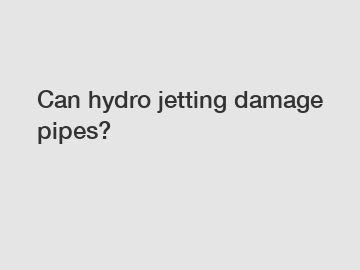Can hydro jetting damage pipes?
Can Hydro Jetting Damage Pipes?
Hydro jetting is a highly effective method used to clear clogs from plumbing systems. It involves using a high-pressure stream of water to dislodge and remove debris, buildup, and obstructions within the pipes. While hydro jetting has gained popularity due to its efficiency, some concerns have been raised regarding its potential to damage pipes. In this article, we will explore whether hydro jetting can indeed cause harm to pipes and discuss the factors that contribute to its safety.
Understanding Hydro Jetting.

Hydro jetting utilizes specialized equipment that delivers water at pressure levels ranging from 1,500 to 4,000 pounds per square inch (psi). The high-pressure water cuts through even the toughest clogs, such as tree roots, grease, and mineral deposits. It can be used for residential, commercial, and industrial plumbing applications.
The Importance of Professional Hydro Jetting.
Undoubtedly, hydro jetting is a powerful plumbing technique when performed by trained and experienced professionals. Hiring a reputable plumbing company ensures that the process is conducted safely and effectively. Professionals have the knowledge and expertise to adjust the water pressure according to the specific needs of the pipes, preventing potential damage.
Factors Affecting the Safety of Hydro Jetting.
1. Pipe Material and Condition.
Different types of pipes can handle different levels of pressure. Older pipes made of more fragile materials, such as clay or cast iron, are more prone to damage compared to newer pipes made of durable materials like PVC or copper. A professional plumber will assess the condition and material of the pipes before determining the appropriate water pressure for hydro jetting.
2. Blockage Type.
The type and severity of the blockage also play a role in the potential for pipe damage during hydro jetting. Softer obstructions, like grease or hair, are more easily removed without causing harm to the pipes. However, solid or hard blockages, such as tree roots, may require higher water pressure, which increases the risk of pipe damage. Evaluating the type of clog is crucial to ensure the optimal pressure is used.
3. Pre-existing Pipe Issues.
If a pipe has significant pre-existing damage, such as cracks, fractures, or weak spots, hydro jetting may exacerbate these issues. In such cases, a professional plumber will usually recommend alternative methods to clear the clog and address the underlying pipe problems. It is crucial to have any pre-existing issues examined and repaired before considering hydro jetting.
Conclusion.
When properly executed by licensed professionals, hydro jetting is a safe and effective method to clear clogs from pipes. Factors such as pipe material, condition, blockage type, and pre-existing pipe issues greatly influence the safety of the hydro jetting process. It is essential to hire experienced plumbers who possess the necessary knowledge and skills to assess these factors and perform the procedure without causing damage to the pipes.
If you face persistent clogs in your plumbing system, it is advisable to consult a reputable plumbing company that offers hydro jetting services. They will thoroughly evaluate your pipes and determine the most appropriate approach for clearing the clogs effectively and safely. Don't hesitate to contact us for more information or assistance with any plumbing issues you may have.
[Contact us] for professional hydro jetting services and have your plumbing system restored to its optimal condition.
For more information, please visit Sub-sea Pipeline Testing News, Oil Flushing System, Pressure Testing Pipe with Nitrogen.
88
0
0


Comments
All Comments (0)